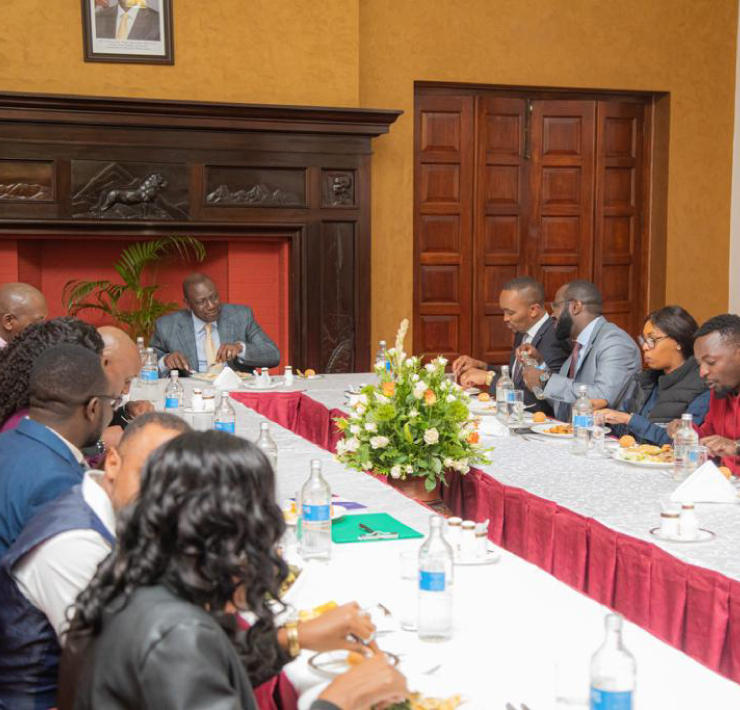President William Ruto gave his first full media interview as head of state soon after the New Year. Just like in 2018, when President Uhuru Kenyatta’s now-famous exchange with Mark Maasai immortalised Japan’s ‘weird borrowing habits’ (h/t Michael Joseph), a group of journalists interviewed the president in a joint media production
NTV journalist James Smart later wrote in the Daily Nation that Ruto’s inaugural roundtable was a pleasant change from what the media had gotten accustomed to in Uhuru Kenyatta’s State House. Smart also revealed that after the interview was done, Ruto invited the journalists to join him in a hearty meal. Readers on social media snidely remarked that all this emphasis on irrelevancies like food and drink meant the media had already been captured, a perception Ruto himself referred to.“They will say I have captured you,” Smart quoted Ruto as having said when he raised the prospect of regular interviews.
To be fair, public unease over State House hospitality is fully justified, hearkening back to at least the Daniel arap Moi era, when people who met President Moi at State House for talks and later defected to KANU were suspected of having been corrupted by “eating ugali”. It was reasonably inferred that chicken necessarily accompanied the staple because a cockerel was KANU’s mascot. The late Martin Shikuku, a longtime Butere MP and opposition stalwart, memorably lost his temper on the talk show “Up Close and Candid” when the host broached the possibility that he might have supped with Moi (I watched this many years ago and I’m still looking for a video of it).
Then there was the infamous media breakfast of 2013. To many people, the 2013 tea washed down a secret deal which, to some, marked the end of Kenya’s media independence. And when the government went on to withhold advertising revenues, and newsroom leaders left suddenly, the infamous State House tea was brought up ad nauseam.
I spoke to Macharia Gaitho, who attended that breakfast as the Chairman of the Kenya Editors Guild. Gaitho calls the continued suspicion of what went down at State House “a monkey on my back” and says any claim a deal was made is “misinformation and propaganda and lies”. He’s gotten tired of responding to these claims because some people won’t change their minds no matter what he says. “I made it very clear at the beginning of my talk (at State House) that we were not there to ask for handouts or favours,” he told me. In particular, journalists had concerns about two parliamentary bills that threatened media freedom, in addition to a culture of government secrecy, and the ejection of journalists from Parliament’s media centre. Gaitho insists there was nothing at that breakfast that made the media “go slow” on government.
But back to the recent post-interview food. To be fair, those who see or hear of journalists eating at State House and wonder if it means the press has been captured are right to be concerned. But these concerns must be weighed against the logistics of journalism. Anyone who has ever observed a live TV production on location knows it takes a small army to put together, from the drivers to the cameramen to the engineers, vision mixers, producers and others.
These are non-celebrities whose names the public does not know and whom no politician would consider wasting a bribe on. For an evening event, they can arrive on location as early as 8 a.m., set up the equipment, test links to the studio and carry out the production. Then, after the last word is said and the last credit has rolled and the last lapel mic unhooked, they still have work to do; disassemble the equipment, incuding all those wires, inventory it, pack it in boxes, load it onto vehicles. Sometimes they have a debrief. For an evening event, all this goes late into the small hours of the morning, and only after all this does anyone think about food.
If you’re doing this at State House, a secure location, bringing your own food or stepping out on a whim to look for a snack is verboten. So for State House to feed people who have official business there for long periods of time shouldn’t surprise anyone, and to go from there to media capture is really a stretch. Besides, that is exactly what the State House hospitality budget is for. Given that the government has set aside KSh 587 million for ‘hospitality services and supplies’ at State House Nairobi this financial year – and in the financial year just ended State House Nairobi hosted 7,641 guests at national celebrations – it’s a bit petty to go after journalists who’ve been working hard for hours.
While you absolutely can decline, and many do, it makes absolutely no sense to leave food bought with your taxes and go home at midnight to boil water and wrestle with maize flour. So eat that food. Crush those bones. Suck that State House bone marrow, and between mouthfuls, demand the hospitality budget be slashed. You’re there in the public interest, after all.

